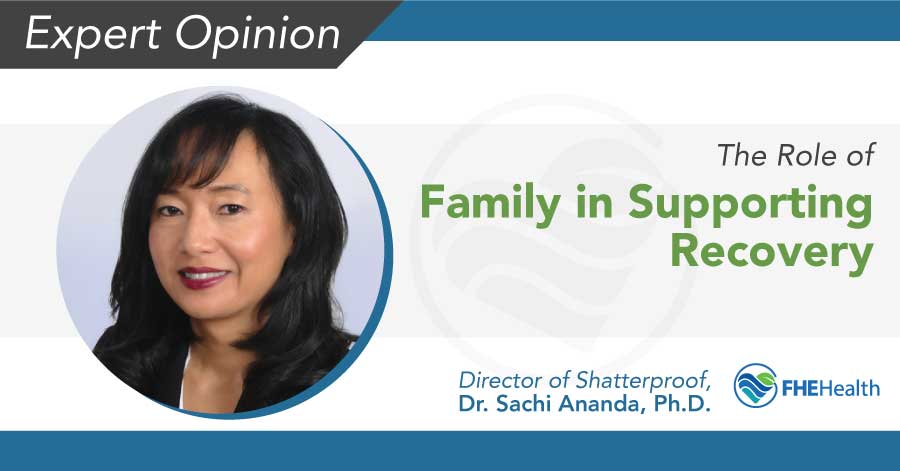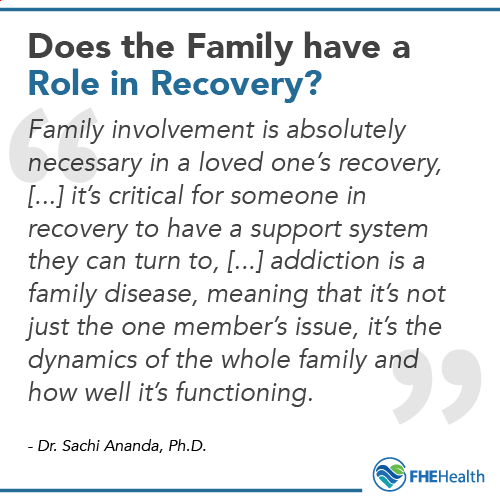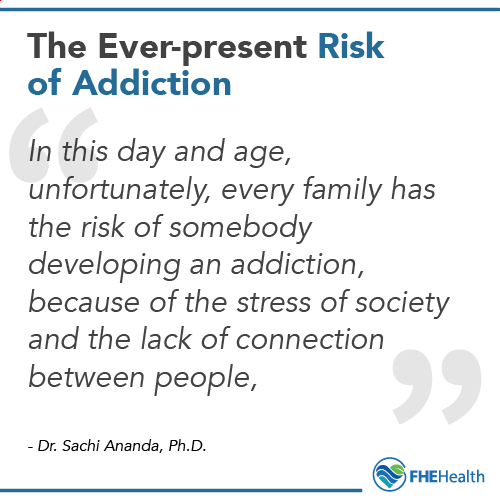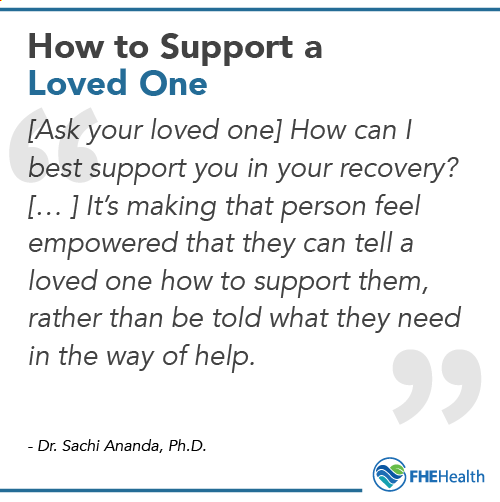
Never underestimate the role of family in supporting a loved one’s recovery from addiction. That’s the takeaway of a large body of research that helps to explain why high-quality rehab providers will, whenever possible, involve family in the treatment process. But, just what is the nature of healthy participation in a loved one’s recovery—and how might it differ from the roles that family members may have previously played in enabling an addiction?
We put these questions and others before Dr. Sachi Ananda, Ph.D. As the program director of FHE Health’s “Shatterproof” program, a treatment track for first responders, Dr. Ananda is intimately acquainted with the family dynamics of addiction and, specifically, the link between substance abuse and family roles. She and her staff regularly serve as a resource to families who want to support their loved one’s recovery but don’t know how. What follow are her insights for anyone who wants to play a positive role in their family member’s recovery from drugs or alcohol.
How Involving Family in the Treatment Process Can Improve Recovery Outcomes
 “Family involvement is absolutely necessary in a loved one’s recovery,” Dr. Ananda said. She added that “it’s critical for someone in recovery to have a support system they can turn to,” because “addiction is a family disease, meaning that it’s not just the one member’s issue, it’s the dynamics of the whole family and how well it’s functioning.”
“Family involvement is absolutely necessary in a loved one’s recovery,” Dr. Ananda said. She added that “it’s critical for someone in recovery to have a support system they can turn to,” because “addiction is a family disease, meaning that it’s not just the one member’s issue, it’s the dynamics of the whole family and how well it’s functioning.”
In this sense, when one person in a family has an addiction, it isn’t their health problem alone. It’s “a sign there’s something wrong with the family system and that it’s out of balance,” according to Dr. Ananda.
How Family Can Support Addiction Recovery
What can the family do to support someone in recovery? Get educated about addiction, Dr. Ananda said, because with greater understanding comes the empowerment to help rather than hurt a loved one’s recovery:
When a family member takes the time to understand addiction and what drives the addictive behavior, they can then help support their loved one better. Rather than blaming the person for not being strong enough or being weak-minded because they can’t get off of a substance, they understand that addiction is a more complex, bio-psycho-social disorder. And it’s not that someone wants to be addicted, it’s just there are many factors that have contributed to their disorder.
Family Roles in Addiction – One Common Trap to Avoid
 Family roles are among the “many factors that have contributed to [a loved one’s] disorder.” When asked to address what family roles and family dynamics enable addiction and create obstacles to recovery, Dr. Ananda was quick to preface her answer with the observation that today no family is immune to addiction.
Family roles are among the “many factors that have contributed to [a loved one’s] disorder.” When asked to address what family roles and family dynamics enable addiction and create obstacles to recovery, Dr. Ananda was quick to preface her answer with the observation that today no family is immune to addiction.
“In this day and age, unfortunately, every family has the risk of somebody developing an addiction, because of the stress of society and the lack of connection between people,” she said.
“That being said,” Dr. Ananda went on to note that “a dysfunctional family would have a higher risk of having an addicted loved one, especially if there’s a risk of rescuing their loved one from the consequences of their drug or alcohol use. If you have that rescuer person who wants to minimize the negative effects, then that person with the addiction will continue to use [drugs or alcohol], because they can; and someone is going to clean up their mess and they don’t have to face the reality of their mess.”
The rescuer role is thus a common trap that family members fall into, dragging their loved one with them. While it’s tempting to think that by helping a loved one avoid the negative consequences of their actions, they’re helping the situation, rescuers are in fact pushing their loved one further away from the motivation to seek treatment. After all, if someone continues to be shielded from the full fallout of their self-destructive habit, they will have little incentive to quit and the same cycle of addiction will continue.
Tips for Supporting a Loved One in Early Recovery
Naturally, families want to know how they can support a loved one in early recovery—especially when it can be difficult to discern how much space or independence to give someone who is newly sober. Here Dr. Ananda emphasized that “family members can and should be supportive of their [loved one’s] process,” but she also cautioned against taking on a managerial role: “Addicts are notorious for being averse to authority … The worse thing a family member can do is tell the addict how to manage their recovery.”
A better approach, according to Dr. Ananda: Ask your loved one, “How can I best support you in your recovery?” … “It’s making that person feel empowered that they can tell a loved one how to support them, rather than be told what they need in the way of help.” And then the help is an invitation rather than an imposition.
Also, “family members need to know it’s not their recovery,” Dr. Ananda said. “The best thing they can do is work on themselves and make sure they’re doing self-care for themselves rather than obsessing about the other person’s recovery.”
How to Understand One’s Role in a Loved One’s Recovery
While self-care and healthy boundaries are critical to playing a positive role in a loved one’s recovery, “getting educated about addiction and recovery” remains equally important. For example, with more understanding about the nature of addiction and its impact on family systems, family members are better positioned to “understand that if they have anxiety about their loved one’s recovery, being anxious for them doesn’t help them.”
Similarly, “if you’re wanting to be the person who is monitoring your loved one’s every move to make sure they’re not engaging in addictive behaviors, that type of monitoring is codependency,” Dr. Ananda said. The goal is to “be an added support, not the person the addict depends on for their recovery.”
Relapse Warning Signs and When to Intervene
 Healthy support of a loved one’s recovery can also entail intervening “as soon as possible” when you have good reason to believe your loved one is imminently at risk of relapse. Here Dr. Ananda gave the disclaimer that “hopefully you will have already had the conversation where the person in recovery has invited you to point out their relapse warning signs.”
Healthy support of a loved one’s recovery can also entail intervening “as soon as possible” when you have good reason to believe your loved one is imminently at risk of relapse. Here Dr. Ananda gave the disclaimer that “hopefully you will have already had the conversation where the person in recovery has invited you to point out their relapse warning signs.”
Among the “red flags” signaling relapse may be: “if your loved one says ‘I don’t want you to help me,’ ‘I can do this on my own,’ or, ‘I just want things to go back to normal.’”
The following warning signs may also indicate that it’s time to intervene, Dr. Ananda said:
- “There’s not an understanding of the importance of reaching out for help. (If that happens, all you can do is set your own boundaries with the person, because they didn’t invite you to help them.)”
- If your loved one committed to going to support group meetings and isn’t going
- If your loved one is lying about what they’re doing and covering up
Ultimately, family members can play a pivotal role in their loved one’s recovery—but it starts with getting educated about addiction and a healthy acceptance of their limits.






